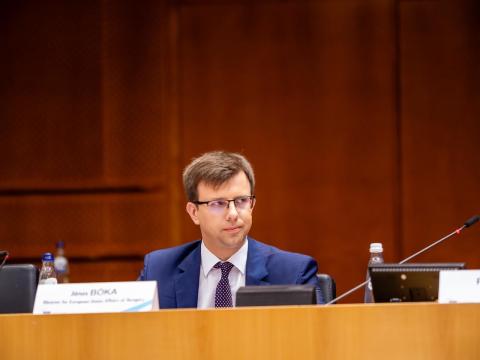European Economic
and Social Committee
The European Economic and Social Committee stands ready to cooperate with the Hungarian Presidency of the Council of the EU
At the July plenary session of the European Economic and Social Committee (EESC), Committee president Oliver Röpke hosted a debate with the Hungarian Minister for European Union Affairs, János Bóka, who presented the main priorities of the Hungarian Presidency of the Council of the EU.
Hungary is taking up the rotating presidency at a sensitive time for Europe, a time of political transition within the institutions and extraordinary challenges for the Union.
Speaking at the EESC plenary session on 10 July, János Bóka, Hungary's Minister for European Union Affairs, stressed the critical role that Hungary intends to play: ‘The 2024 Hungarian Presidency of the Council comes at a time of multiple crises. We are witnessing war in our neighbourhood, declining European competitiveness, increasing tensions in the EU’s trade relations, demographic challenges, uncontrolled migration and decreasing prospects for European farmers.’
Pointing out that the Committee has a long-standing history of working well with Council presidencies, Oliver Röpke spoke about the institution’s role as a guardian of European values: ‘Our Committee is committed to working closely together with the Hungarian Presidency to ensure that the EU is taking action on what Europeans feel are the most urgent priorities. We will be invaluable partners, but also outspoken and constructive critics. Civil society has a strong voice, and we will ensure that it is heard.’
Mr Bóka added that the adoption of a New European Competitiveness Deal was a key priority for the Hungarian Presidency. They were keen to create the conditions for sustainable growth, deepen the internal market, focus on supporting small and medium-sized enterprises, promote the green and digital transition in partnership with European economic stakeholders and individuals, foster international cooperation, and ensure the stability and sustainability of good quality jobs.
During the ensuing debate, the President of the EESC’s Employers’ Group, Stefano Mallia, pointed out that ‘we need to create the conditions to make sure that the “greatness” of the EU is not only protected but also allowed to grow in the right regulatory environment. Too many businesses and too many young people are leaving Europe. We need to tackle the issue of declining competitiveness: a healthy business community is only possible with better designed regulation.’
Lucie Studničná, President of the EESC’s Workers’ Group, recognised that ‘we are witnessing in general a rise in political extremism, fuelled by difficult living conditions and the lack of opportunities. A Europe dotted with queues for food banks and people who might not have heating this winter, if they have a home at all. A Europe surrounded by the dead who tried to reach safety there, fleeing war and persecution. Europe, hiding behind walls, figurative and real, cannot be “great again”.’
Speaking about the Hungarian priority of a New European Competitiveness Deal, Séamus Boland, President of the EESC’s Civil Society Organisations’ Group, said that it would be crucial to balance competitiveness and social policies in order to combat poverty: ‘The challenge is to create a Union that goes forward, that develops policies that strengthen it in terms of the green transition and social adjustment and that leaves no one behind. Europe has strong values in relation to fundamental rights and freedoms. “Making Europe great again” is making sure we never lose those freedoms.’
Some EESC members voiced concerns about Hungary’s position on Russia’s war of aggression against Ukraine, respect for the rule of law in the EU, and the shrinking space for civil society in Hungary. José Antonio Moreno Díaz pointed out that, based on the European Commission’s Hungary report, the Hungarian government was mistreating organised civil society, intimidating civil society, persecuting NGOs, and attacking the LGBTQ community and migrants. Jan Dirx said that it was painful to see the Hungarian prime minister visiting Moscow and he wondered whether the Hungarian Presidency would abide by European values.
Mr Bóka said that the Hungarian Presidency was fully aware of its responsibilities and fully subscribed to both the EU’s common position on Ukraine and the rule of law and European values.
The EESC will contribute with ten exploratory opinions
Hungary took over the rotating Presidency of the Council of the European Union on 1 July 2024, a few weeks after the European elections. It will lead the Union for six months, until 31 December 2024, and play a key role in finalising the work on the new 2024-2029 EU political framework.
The Hungarian Presidency has already contacted the EESC and requested ten exploratory opinions. ‘Exploratory’ opinions are drawn up by the EESC before the Commission has even drafted its proposals. This enables the various components of organised civil society represented within the EESC to express the expectations, concerns and needs of grassroots stakeholders.
Some examples:
1) Paving the way to EU accession for the Western Balkans
3) General-purpose AI: way forward after the AI Act
4) Fostering sustainable and resilient food systems at times of growing crises
For more information on the EESC’s activities during the Hungarian Presidency, please check the EESC website.
